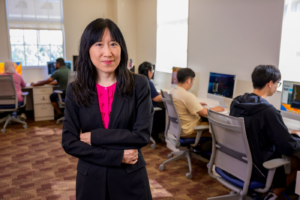Researchers with Southern Methodist University (SMU) and NASA today announced they have received a patent for MATA, an AI-powered research assistant that can answer questions on scientific data.
Consumers have grown accustomed to asking questions of conversational AI agents like Alexa and Siri, which were developed by Amazon and Apple, respectively. These chatbots have been trained on general knowledge about the world and current events.
MATA works in a similar manner as Alexa and Siri, but it’s been trained on a large corpus of Earth science data collected by NASA. Specifically, MATA, which is Sanskrit for Earth, was trained on hundreds of terabytes of data collected over the past 40 years by NASA sensors located on land, in sea, and in space.
The patent was awarded to Jia Zhang, who is the interim chair and professor in the Department of Computer Science in SMU Lyle’s School of Engineering, and her NASA collaborators. Zhang led the development of MATA to streamline the ability of scientists to access and share data.
MATA was designed to let scientists ask questions that are time and geospatially aware, such as “What was the weather like in San Francisco three days ago?” When MATA receives a question, it figures out where the appropriate data to answer it is stored, and conducts any additional computations that are needed before generating a conversational response.
The idea is to accelerate access to scientific data, says Zhang, who is also the Cruse C. and Marjorie F. Calahan Centennial Chair in Engineering in SMU’s engineering school.
“By developing a virtual assistant that continuously integrates community intelligence, provides personalized research assistance in a conversational manner and is geo-spatially and space-time aware, we can build better collaboration within the Earth science community,” Zhang said, according to a SMU news brief. “Our goal is to help scientists leverage collective knowledge and data to better understand the Earth and climate change.”
Zhang says she hopes to use technology like this to develop similar offerings in other fields, such as healthcare applications that can detect disease early.
For more information, see SMU’s news brief on MATA here.
Related Items:
Conversational AI Poised to Be Major Disrupter
How Machine Learning Can Help Us Stop Climate Change
IBM’s New Geospatial AI Model on Hugging Face Harnesses NASA Data for Climate Science
The post Meet MATA, an AI Research Assistant for Scientific Data appeared first on Datanami.

0 Commentaires